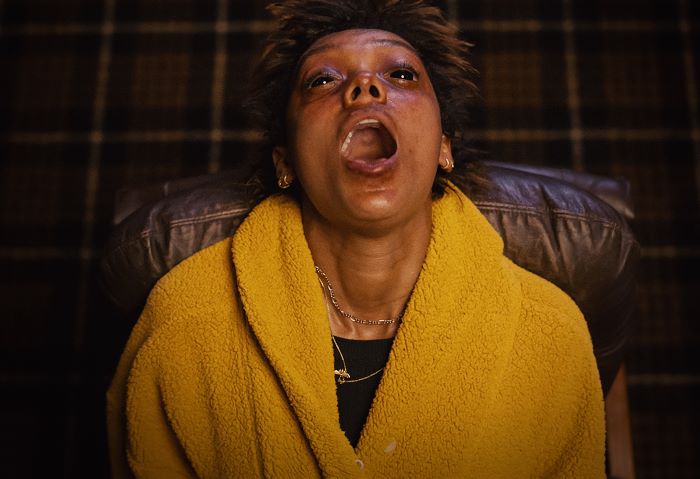Raucous and unsettling, Talk to Me continues the streak of bleak horror films in recent years explicitly drawn from trauma. One could also trace some of this Australian picture’s sense of isolation, dark comedy, and unrelenting grimness to Ozploitation pictures like Wake in Fright (1971) and Long Weekend (1978). Some horror has a satisfying quality, where a hero or heroine slays the slayer, and some, like this movie, feel as if the characters and their situations are tottering and irrevocable.
Mia (Sophie Wilde), lamenting her mother’s recent passing, is distant from her father (Marcus Johnson). (In the tradition of absent adults in horror, he is first seen behind Mia in a kitchen, blurred out.) She finds family by proxy with close friend Jade (Alexandra Jensen), Jade’s younger brother Riley (Joe Bird), and their wearied, yet brassy single mother Sue (Miranda Otto). Mia becomes a sisterly figure, spending more time at Jade’s house than her own. Adding some slight unease, though seemingly innocuous at first, Jade’s current romantic interest, Daniel (Otis Dhanji), is Mia’s ex.
All these relationships are soon toppled by an occult game: A severed, fossilized-in-ceramic hand is circled about in their town at teen parties. If one takes the hand in theirs, it can induce a portal to the dead. The game itself is somewhat hokey, causing its partaker’s pupils to dilate heavily, like goofy, exaggerated Snapchat filters. This wild imagery and the frenzied, fearful ways in which the participants react are why it has become a folkloric, viral hit on social media. It also has an addictive, thrill-ride quality that some players want to repeat. This is enacted in a delirious sequence set to a techno remix of Édith Piaf—and the film’s conspicuous comparison to drug use. A non-believer at first, Mia, ends up using the hand to try to communicate with her mother. As in most movies, dipping into the occult has dire ramifications.
The directors, twin brothers Danny Philippou and Michael Philippou, are known for their short films on the cheeky YouTube channel RackaRacka. Their efforts are occasionally impressive here. Sequences involving Mia’s visions are hauntingly wicked and smoothly edited (by Geoff Lamb). The team presents ghosts matter-of-factly and lifelike, utilizing practical make-up effects, which become more chillingly effective and immediate than fluttering CGI spirits of many modern supernatural films. The sound design is extremely exaggerated—every arm brush against fabric is heightened—so when the jump scares and bone-breakings emerge, it’s crushing.
Despite the film’s moods of occasional humor, there are difficult elements of self-harm involving young teens, especially Bird’s character, which can be arduous to endure. But the technical elements and the solid acting by Wilde, Jensen (particularly natural and unfussy), and Bird carry the film into the momentum of the superb latter half. Here, Mia, who is Black, and whose name could be a play upon the abbreviation for “disappeared,” walks through hospital corridors while the backs of her White surrogate family are turned away from her. Whether intended or not, a sense of racial displacement is perceptible as Mia perilously tries to undo a ravaging spell.

















Leave A Comment